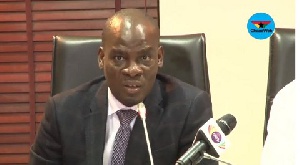- Home - Entertainment
- Lifestyle News
- Entertainment Videos | TV
- Year In Review
- Music News
- Entertainers
- Entertainment Archive
- Entertainment Photos
- Jokes
- Entertainment Headlines
- Ameyaw Debrah
- Brown GH
- Celebrities Buzz
- GH Base
- Ghana Celebrities
- Gh Gossip
- GH Page
- GH Splash
- Hot Gossip GH
- YEN

Politics of Sunday, 20 January 2019
Source: ghananewsagency.org
Minority, best vehicle for Parliamentary oversight – Haruna Iddrisu
The best vehicle for Parliamentary Oversight in Ghana is the Minority as the Majority finds it difficult to hold their governments accountable, Mr Haruna Iddrisu, the Minority Leader in Parliament, has said.
He said other means of exercising Parliamentary Oversight includes debates, committees, questions, interpellation, private members motions and adjournment, debates, approval of executive appointments and censure of ministers.
“On the balance of the performance I dare say Parliamentary oversight in Ghana isn’t a myth but reality. There is, however, much room for improvement especially in the area of research and policy analysis to inform debate and scrutiny of governmental policy and action,” he said.
Mr Iddrisu stated this in his presentation at the 70th New Year School and Conference at the University of Ghana, Legon.
Parliamentary Oversight involves the review, monitoring and supervision of government and public agencies, including the implementation of policy and legislation.
Others are to detect and prevent abuse, arbitrary behaviour or illegal and unconstitutional conduct on the part of government and public sector agencies.
It also includes holding the government accountable in respect of how the taxpayers’ money is used.
Speaking on the topic: “Effective Legislative Oversight for Countervailing Authority,” Mr Iddrisu said the oversight function of the legislation was essential since it ensured horizontal accountability of the government and its agencies to the people through their elected representatives.
He said Parliamentary oversight was normally carried out to ensure that powers conferred on the executive and its agents were being utilised according to established regulation.
“Parliamentary Oversight comes in two forms: ‘ex-ante oversight’- Overseeing the preparation of a given policy or ‘ex-post oversight’-Overseeing the execution and implementation of a given policy.”
Mr Iddrisu said though most legislatures had the power to keep the government accountable for its actions, there was considerable variation in the tools that they could employ to perform their oversight function.
This variation reflects to a large extent difference in the form of government and type of constitutional arrangements.
He said Parliamentary Oversight was rooted in the Constitution, the Standing Orders of Parliament and Customs and Practices.
He cited Articles 78 and 79 of the Constitution, which enjoin the President to seek prior approval of Parliament for his nominees for ministerial and deputy ministerial appointments.
Whist Article 103 empowers Parliament to appoint committees for the effective discharge of its function and such committees shall be charged with functions including the investigation and inquiry into the activities and administration of ministries and departments as Parliament may determine.
Article 174 of the Constitution says; “No tax can be imposed otherwise by or under the authority of Parliament neither can a tax be waived or varied without the authority of parliament”.
Further Article 178 provides that amounts of money shall not be withdrawn from the Consolidated Fund except to meet an expenditure that is charged on the Fund by the Constitution or by an Act of Parliament.
Mr Iddrisu said the public naming and shaming by the Public Accounts Committee of Parliament had helped to mitigate financial malfeasance by public officials.
He said one key challenge was the speed with which Parliament approves some agreements and passed certain bills; stating that; “It leaves the public wondering whether there was proper scrutiny - example the Fiscal Responsibility Bill, 2018, which was passed under certificate of urgency and the drone deal”.
“There is also excessive politicisation of certain matters, which whittle down the power of Parliamentary Oversight”.
He said the over intrusion of the Executive with promise of reward of ministerial appointments or appointments onto boards of parastatals for members who do their bidding was another challenge.
Mr Iddrisu said the speaker using his or her powers to protect the executive to make it “look good” by refusing questions or curtailing debate on matters deemed embarrassing to government also hinders Parliamentary oversight.
The 70th Annual New Year School and Conference, which took place from January 14 to 18, was on the theme: “Building Strong Institutions for Democratic Consolidation in Ghana”.
It was organised by the School of Continuing and Distance Education of the College of Education, University of Ghana, in collaboration with the Ministry of Local Government and Rural Development.











